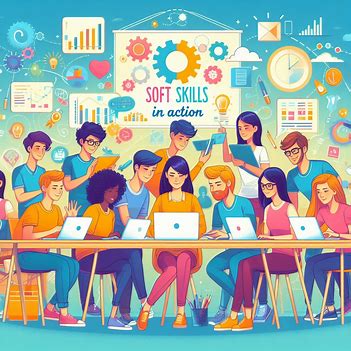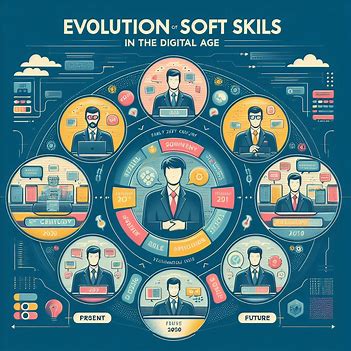
TABLE OF CONTENT
1. Introduction
- Definition of Soft Skills
- Importance of Soft Skills in Education and Career
2. Understanding Soft Skills
- Communication Skills
- Emotional Intelligence
- Problem-Solving Skills
3. Incorporating Soft Skills in Education
- Classroom Activities
- Extracurricular Programs
- Case Studies
4. Application of Soft Skills in Career Growth
- Leadership Development
- Teamwork and Collaboration
- Conflict Resolution
5. Implementing Soft Skills in Daily Life
- Effective Communication in Personal Relationships
- Emotional Intelligence in Handling Stress
- Problem-Solving in Everyday Challenges
6. Recommended Books on Soft Skills
- “Emotional Intelligence” by Daniel Goleman
- “How to Win Friends and Influence People” by Dale Carnegie
- “The 7 Habits of Highly Effective People” by Stephen Covey
7. Short-term Courses for Soft Skill Development
- Coursera: Leadership and Emotional Intelligence
- LinkedIn Learning: Effective Communication Strategies
- Udemy: Problem-Solving Techniques
8. Conclusion
- Recap of the Importance of Soft Skills
- Encouragement for Continuous Development

1.Introduction
In today’s rapidly evolving educational and professional landscape, the significance of soft skills cannot be overstated. While traditional academic prowess remains valuable, it’s the intangible abilities, often referred to as soft skills, that set individuals apart in both their educational journey and career pursuits.
Soft skills encompass a broad spectrum of attributes that enable individuals to navigate social interactions, communicate effectively, and tackle challenges with finesse. As we delve deeper into the realms of education and career, it becomes evident that mastering these skills is not just advantageous but imperative for success.
2.Understanding Soft Skills
Communication Skills
Effective communication lies at the heart of every meaningful interaction, whether it’s articulating ideas in a classroom setting or conveying visions in a boardroom. Soft skills such as active listening, empathy, and clarity of expression empower individuals to connect with others on a profound level, fostering collaboration and synergy.
Emotional Intelligence
Emotional intelligence, often hailed as the cornerstone of personal and professional development, encompasses self-awareness, self-regulation, social awareness, and relationship management. It enables individuals to navigate complex emotions, understand others’ perspectives, and forge meaningful connections, thereby fostering a conducive environment for growth and innovation.
Problem-Solving Skills
In an ever-changing landscape fraught with challenges, the ability to think critically and devise innovative solutions is paramount. Soft skills such as analytical thinking, creativity, and adaptability empower individuals to approach problems with resilience and resourcefulness, turning obstacles into opportunities for growth and advancement.
3. Incorporating Soft Skills in Education
Education serves as the bedrock for cultivating essential skills that transcend academic realms. By integrating soft skills development into the educational curriculum, institutions can equip students with the tools they need to thrive in a dynamic world.
Classroom Activities
Interactive exercises, group discussions, and role-playing scenarios provide students with opportunities to hone their communication, collaboration, and problem-solving skills in a supportive environment. By engaging in real-world simulations and collaborative projects, students gain practical insights into the application of soft skills in various contexts.
Extracurricular Programs
Beyond the confines of traditional classrooms, extracurricular activities offer students a platform to explore their interests, develop leadership abilities, and cultivate interpersonal skills. Whether through sports teams, debate clubs, or community service initiatives, students can leverage these opportunities to enhance their soft skills while forging lifelong connections.
Case Studies
Analyzing real-life case studies and success stories enables students to glean insights into the practical application of soft skills across diverse industries and domains. By dissecting scenarios, identifying key challenges, and brainstorming solutions, students develop critical thinking abilities and strategic decision-making skills essential for future success.

4. Application of Soft Skills in Career Growth
In today’s competitive job market, possessing technical expertise alone is no longer sufficient. Employers increasingly prioritize candidates who demonstrate a robust set of soft skills that complement their professional qualifications.
Leadership Development
Effective leadership transcends hierarchical structures and is rooted in the ability to inspire, motivate, and empower others. Soft skills such as empathy, communication, and conflict resolution are integral to effective leadership, enabling individuals to foster inclusive cultures and drive organizational success.
Teamwork and Collaboration
In an era of globalization and interconnectedness, the ability to collaborate effectively with diverse teams is essential for achieving organizational objectives. Soft skills such as active listening, consensus building, and adaptability facilitate seamless collaboration, fostering synergy and innovation within teams.
Conflict Resolution
Conflicts are an inevitable aspect of professional life, but how individuals navigate and resolve them can make all the difference. Soft skills such as negotiation, diplomacy, and emotional intelligence enable individuals to manage conflicts constructively, fostering positive outcomes and preserving relationships.
5. Implementing Soft Skills in Daily Life
Beyond the academic and professional realms, soft skills play a pivotal role in shaping our personal lives and interactions. By incorporating these skills into our daily routines, we can enhance our relationships, manage stress more effectively, and navigate life’s challenges with confidence.
Effective Communication in Personal Relationships
Communication lies at the foundation of healthy relationships, be it with family members, friends, or romantic partners. By cultivating active listening skills, expressing empathy, and fostering open dialogue, individuals can deepen their connections and foster mutual understanding in their personal lives.
Emotional Intelligence in Handling Stress
In today’s fast-paced world, stress has become an inevitable part of daily life. However, individuals with high emotional intelligence can navigate stress more effectively by recognizing and regulating their emotions, practicing self-care, and seeking support when needed.
Problem-Solving in Everyday Challenges
Life presents a myriad of challenges, both big and small, that require creative problem-solving skills. By approaching problems with a growth mindset, breaking them down into manageable tasks, and seeking alternative perspectives, individuals can overcome obstacles and emerge stronger and more resilient.
6. Recommended Books on Soft Skills
For those seeking to delve deeper into the realm of soft skill development, numerous insightful books offer practical guidance and invaluable insights. Here are some recommended reads:
- “Emotional Intelligence” by Daniel Goleman: This seminal work explores the importance of emotional intelligence in personal and professional success, offering practical strategies for enhancing self-awareness, self-regulation, and social skills.
- “How to Win Friends and Influence People” by Dale Carnegie: A timeless classic, this book offers timeless principles for building meaningful relationships, fostering trust, and influencing others positively through effective communication and interpersonal skills.
- “The 7 Habits of Highly Effective People” by Stephen Covey: In this transformative book, Covey outlines seven foundational habits that empower individuals to achieve personal and professional effectiveness. From prioritizing tasks to fostering synergy in relationships, Covey’s insights offer a roadmap for success.
7. Short-term Courses for Soft Skill Development
In addition to self-study through books, online courses provide a convenient and accessible avenue for individuals to develop and enhance their soft skills. Here are some recommended short-term courses:
- Coursera: Leadership and Emotional Intelligence: This course explores the principles of effective leadership and emotional intelligence, equipping participants with practical strategies for leading with empathy, resilience, and authenticity.
- LinkedIn Learning: Effective Communication Strategies: Designed for professionals seeking to enhance their communication skills, this course covers a range of topics, including active listening, persuasive communication, and conflict resolution.
- Udemy: Problem-Solving Techniques: This course offers practical frameworks and methodologies for approaching complex problems systematically, fostering creativity, critical thinking, and innovation.
8.Conclusion
In conclusion, soft skills are not just desirable but indispensable assets in today’s education and career landscape. By prioritizing the development of soft skills, individuals can unlock their full potential, thrive in diverse environments, and chart a course toward personal and professional fulfillment.
“Unleashing Your Potential: Why Soft Skills Matter More Than Ever in Education & Career” offers a comprehensive exploration of the pivotal role that soft skills play in shaping individuals’ educational journeys and career trajectories. From understanding the core principles of effective communication and emotional intelligence to applying these skills in everyday life and professional settings, this article equips readers with practical insights and actionable strategies for personal and professional growth.
FAQs
1. What are soft skills, and why are they important? Soft skills encompass a range of interpersonal attributes, including communication, emotional intelligence, and problem-solving abilities. While technical skills are essential, soft skills are equally crucial, as they enable individuals to navigate social interactions, collaborate effectively, and adapt to changing environments.
2. How can soft skills be developed? Soft skills can be developed through various means, including experiential learning, practice, and self-reflection. Engaging in activities such as role-playing scenarios, group discussions, and collaborative projects can help individuals hone their soft skills in real-world contexts.
3. Are soft skills relevant in the workplace? Yes, soft skills are highly relevant in the workplace, as they enable individuals to thrive in diverse team environments, communicate effectively with colleagues and clients, and navigate challenges with resilience and adaptability. Employers increasingly value candidates who possess a robust set of soft skills alongside technical expertise.
4. Can soft skills be learned through online courses? Yes, online courses offer a convenient and accessible avenue for individuals to develop and enhance their soft skills. Platforms such as Coursera, LinkedIn Learning, and Udemy offer a wide range of courses covering topics such as leadership, communication, and problem-solving.
5. How can soft skills contribute to personal growth? Soft skills play a crucial role in personal growth by fostering self-awareness, empathy, and resilience. By developing these skills, individuals can enhance their relationships, manage stress more effectively, and navigate life’s challenges with confidence and grace.
6. What is the importance of emotional intelligence in soft skill development? Emotional intelligence forms the cornerstone of soft skills development as it encompasses self-awareness, self-regulation, social awareness, and relationship management. Individuals with high emotional intelligence can navigate interpersonal dynamics, communicate effectively, and resolve conflicts constructively, thereby fostering success in both personal and professional realms
In a world where adaptability and interpersonal skills are increasingly valued, mastering soft skills is essential for unlocking one’s full potential in education and career. By prioritizing the development of soft skills and leveraging resources such as books and online courses, individuals can cultivate the competencies needed to thrive in today’s dynamic and interconnected world.
